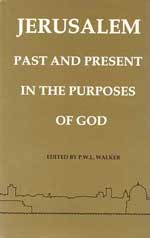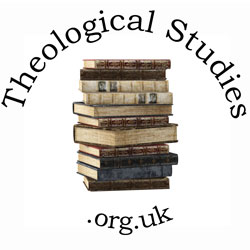Jerusalem: Past And Present in the Purposes of God
P.W.L. Walker ed.
Theology on the Web helps over 2.5 million people every year to find high quality theological resources that will help to equip them to serve God and to know Him better (2 Timothy 2:15). Like other websites that provide free services, it is dependent on donations to enable it to grow and develop and only 0.004% of visitors currently do so. If you would like to support this site, please use one of the options to the right of this message.
Chapters of this book are reproduced here by kind permission of their authors. I would like to express my thanks to Dr. Peter Walker and Clive Frampton of the Deo Gloria Trust. Tom Wright's article is hosted on this own site.
 |
Table of Contents
|
Publication Details:
Cambridge: Tyndale House, 1992. Pbk. ISBN: 0951835610. pp.210.© 1992 Deo Gloria Trust, reproduced by permission.
Editor's Preface
[p.ix]
Few cities have so continuously exerted such influence upon the religious conscience of mankind as has the city of Jerusalem. In a few years this fascinating city will celebrate not only the 2,000th anniversary of the birth of Christ in nearby Bethlehem, but also the 3,000th anniversary of its foundation by King David, and throughout that time it has been a focus for people's prayers, an object of pilgrimage and a subject for written reflection. Our present period is no exception with Jerusalem receiving countless visitors each year and continuing to be a central issue in the settling of the Israeli/Palestinian problem.
Yet Jerusalem calls forth yet deeper reactions. In each of the three great monotheistic religions (Judaism, Christianity and Islam) there are traditions which see this city as 'holy', or in some sense special to God and unique within his purposes. Part of the tension which the city experiences is caused precisely by such religious convictions as they clash and frequently contradict one another.
In such a situation it is timely for Christians to reflect more deeply on their own attitudes towards Jerusalem. In doing so, they soon discover that there are several possible 'Christian' approaches to Jerusalem which need to be compared and evaluated. Some would find the notion of Jerusalem's 'holiness' an obvious category in the light of the unique events associated there with the life of Christ; others would find 'holiness' an uncomfortable notion, but be adamant that Jerusalem is special in God's sight on the grounds of the Old Testament revelation; whilst a third group would have questions about both of these.
The tensions between these different Christian attitudes towards Jerusalem are today that much greater, in the light of the return to the land of the Jewish people and the 'restoration' of Jerusalem in recent years; for some these are clear fulfilments of biblical prophecy, for others such ideas would be anathema. This latter issue is obviously of particular importance to Evangelical Christians who seek in their theology to acknowledge the authority of the Scriptures.
[p.x]
The papers in this volume all seek, in their different ways, to address this question of the theological significance of Jerusalem (though the first chapter relates more generally to the important, foundational question of the Christian use of the Old Testament today). Whilst some of the papers (particularly in Part One) reach similar conclusions, no single consensus has emerged, nor was a synthesis sought. The papers in this book illustrate the variety of theological approaches to this subject. Opinions expressed in these pages can be attributed only to their respective authors.
Since 1989 there has been a series of Christian conferences in and around London focusing on issues relating to the Middle East. Each of the contributors to this volume has spoken to their subject at one of these, though the written paper in some instances is substantially different from the original address.[1] These conferences were held under the joint auspices of Christian Impact and the Deo Gloria Trust, with support in different ways from All Nations Christian College, the Tyndale Fellowship, the Church Missionary Society and the Church's Ministry amongst the Jews; the organising committee would like to thank all of these bodies for their timely help.
Personally I would like to add a word of thanks to: the Deo Gloria Trust, Tyndale House, Colin Chapman, Walter Riggans, Bill Broughton, David Pileggi, David Goodenough, Richard Massey, Stephen Walley, Andrew Clarke, Bruce Winter, Ian and Margaret Keiller, my secretary, Anne Mills, and my wife, Georgie who have all given valuable assistance in different ways.
[p.xi]
Finally, this volume will have served some of its purpose if Christians are able as a result to pray in a more informed way for all those who live and work in Jerusalemnot only for all political leaders in the important peace negotiations currently in process, but also for the leaders of the differing churches in their frequently stressful situations. The coming years will no doubt present church leaders in Jerusalem with many challenges and opportunities-including how best to celebrate the important anniversaries mentioned above. For British readers the issues of this Middle Eastern city may initially seem remote ('there is a green hill far away')-though on closer inspection, they prove to be of quite central significance within our Christian theology; for those, however, who actually live in Jerusalem they are naturally their daily concern. This volume is presented in the hope that Christians will be more aware of the issues at stake, and thereby better equipped to be agents of peace and increased understanding in a situation where these qualities are so often sorely needed.
Peter Walker, St Saviour's, Tonbridge September 1992
IMPORTANT NOTE: To avoid confusion or suggestion of
modern political affinities, the Land of Israel / Palestine is normally referred
to in this volume by the name which it would have been given in the particular
period under discussion.
Footnote
[1] This is particularly the case with ch. 5 (substantially new) and ch. 7 (much abbreviated); ch. 8 appears here for the first time. The following scholars also gave lectures, whose viewpoints (though not included here for reasons of space) we trust to be represented in this volume, at least in part: Gervais Angel (on Rom. 9-11), John Edwards (on the Crusades), Michael Prior (Director of 'Living Stones'), Salim Munayer (a Christian Arab), Ruth Snow (a Messianic Jew), Richard Harvey (CMJ) and Walter Riggans. We were grateful too to John Levy and Taysir Kamleh for introducing us respectively to the Jewish and Islamic perspectives on Jerusalem. Because of the Kurdish refugee problem, Gabi Habib (General Secretary of the Middle East Council of Churches) had to withdraw at the last moment, though he was represented by David Goodenough.









